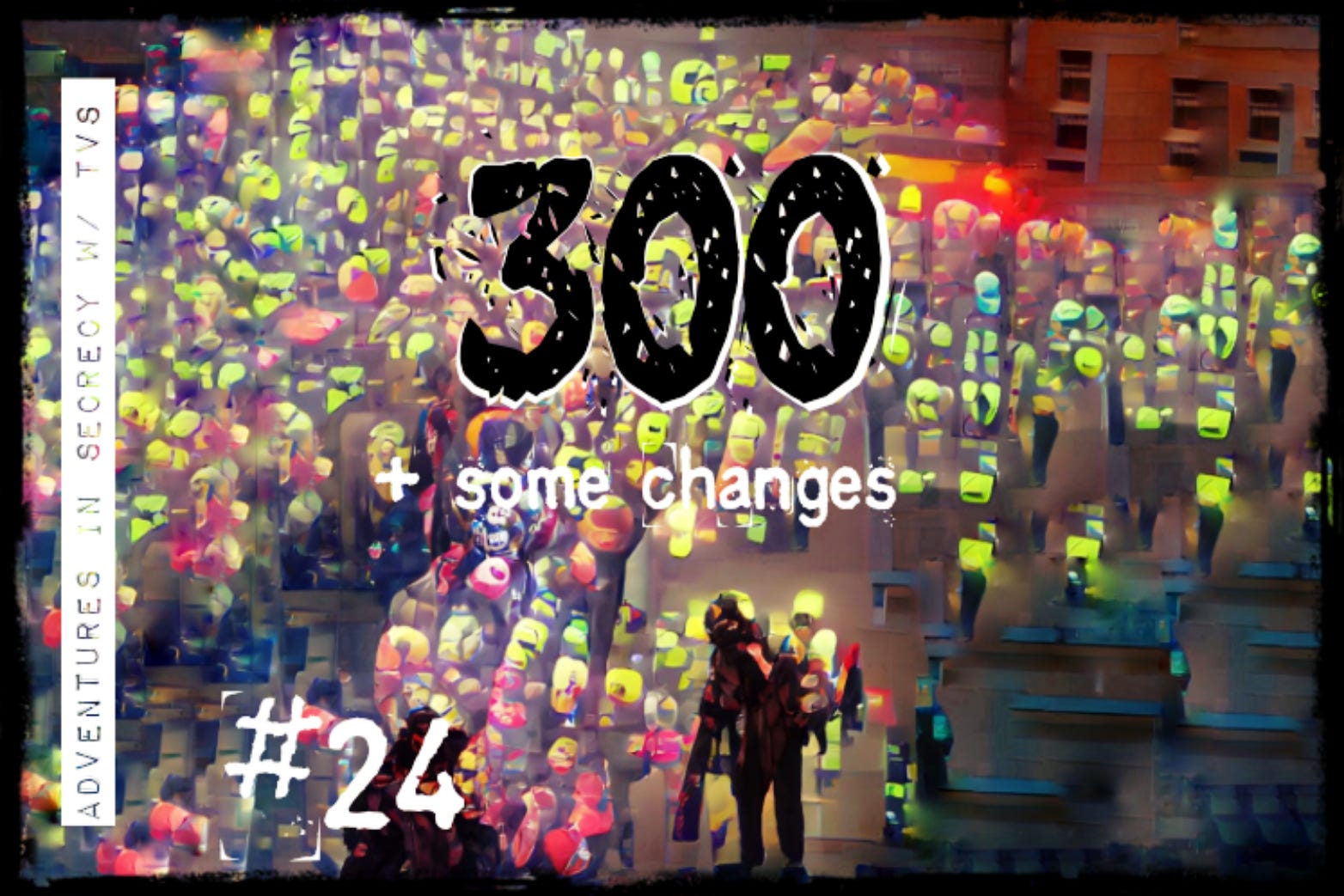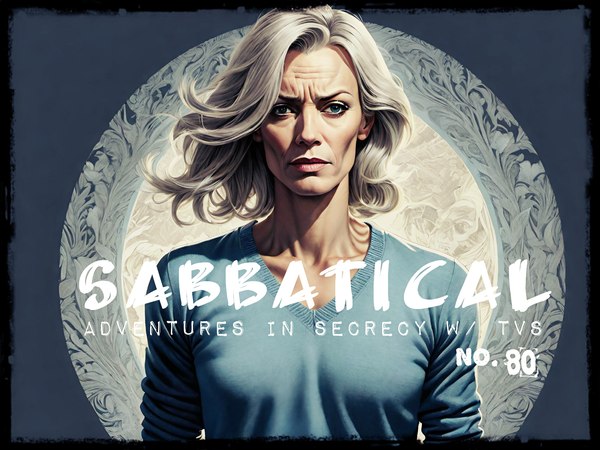300 + some changes
FKA "1001 True Fans—Part 2: Do I Even Know 1001 People?"
First, the second thing: changes.
I have decided on a new publishing schedule. You may have noticed. If not, that’s fine, too. Fiction will be put out on Wednesdays, thematic nonfiction on Thursdays. The serial Gaucho is published approximately every ten days or so, aiming for Tuesdays. That’s the scheduled posts. As always, I will erratically publish other posts as they occur.
Those are the changes.
Second (and not represented in the title), be sure you’re taking a look at Adventures in Secrecy on the website—at least now and then. The magazine styling and header tabs provide a much different navigation experience than just getting them one post at a time in long waterfall style format or in individual emails.
Third, read (or reread) this.
Now, as you can see, I presumed everyone knew what I was referring to when I made reference to the thousand true fans idea, so I’ll back up and go over what that is.
A Thousand True Fans
The concept is attributed to this dude named Kevin Kelly. You can read his essay here, and in Tim Ferriss’ book Tools of Titans—which, incidentally, I flipped through in a Barnes & Noble once, saw it contained golf swing illustrations, and put it back on the shelf.
If you want to keep reading right now without going off to check that stuff out, here’s the premise:
“To be a successful creator you don’t need millions. You don’t need millions of dollars or millions of customers, millions of clients or millions of fans. To make a living as a craftsperson, photographer, musician, designer, author, animator, app maker, entrepreneur, or inventor you need only thousands of true fans.”
He then goes on a bit to define what a ‘true fan’ is, as well as how you the creator should interact with them, but the bottom-line math behind it is that you need to make a hundred USD in profit from each fan each year in order to make about 100k. Obviously if you’re cool with making less than that, you need either fewer than 1,000 fans or can make less profit per fan.
That’s the basics of the idea.
The TVS Math Is …
Three hundred. I’ll elaborate.
As I’ve said, my pricing is based on whatever the current price of a basic Netflix subscription is—or rather was when I launched this publication, which at the time was $8.99. I offer a bit of an annual discount at $86.99, so let’s go with that one.
If I were to have a 1,000 paid subscriptions, I would gross $86,990 annually from this newsletter, and I would be over the effing moon. I would have unlocked that perennial bouszhie dream of being able to ‘make a living from my art.’
Frankly, though, I don’t need to pull in $86k (before taxes) annually in order to ‘live off my art.’ My number is closer to $26k, which works out to 300 ‘true fans.’
But a couple of things stand in the way, not the least of which is …
Do I Even Know Three Hundred People?
You might be like, “T, chill. You don’t have to know every rando who subs your newsie.” According to Kevin Kelly’s proposition, yeah, ya do. And engage with them directly, too. Which then gives rise to the questions: Is that possible? And, if so, is it healthy?
How many people can a gal keep up with really?
As some of you know (and the rest of you ought to know cos I never shut up about it), I’m super active on the mostly-dead social media network, Ello. I’ve run the writing community Ellowrites there since 2017. If you look at my personal profile, I’ve got about 900 followers, and Ellowrites has 111 thousand followers. Yet when I made a list of all the folks I felt like I knew through Ello and who I was interacting with on even a somewhat regular basis, guess what that number was? About 35.
Later, when I launched my first novel, Everything Fails (click that title and buy a copy, please, or just ask me for one, and I’ll send it to you), I made a list of folks who could be a part of my launch team and then about how many people I thought might want to support me by buying the book. How many were on that list? Apparently I can’t find it, but if memory serves is was about 50.
Is it healthy—particularly for introverts (since most writers are)—to engage directly with a thousand people on the reg?
Probably not. That’s me just eyeballin’ it, so let’s look a bit deeper, see if there’s any data out there.
Turns out, there’s this idea called Dunbar’s Number, which says:
“An individual human can maintain stable social relationships with about 150 people.”
But …
“A new study indicates that a cognitive limit on human group sizes cannot be derived in this manner.1”
Okay, so maybe there isn’t really any science to back up some kind of hard limit of how many people you can know and maintain stable relationships with, but I have my own feeling about it, and I’m guessing it’s less than 300.
So that’s one complication.
There are others …
Who Deserves ‘Financial Freedom’? What’s the Value of Art? and Why Don’t the People Who Actually Know Me Want to Be a Part of It?
So I’ve written before about that last question over ‘chere. But the reason I stuck all three together is that I believe the answers to them intertwine to reveal something interesting about fandom.
Famously, His Royal Badness (RIP, pour one out, etc.) said something like, “I don’t like the term ‘fan’ because ‘fan’ is short for ‘fanatic.’ I like to think of us as friends.” [Ed. Quote is approximate.] Okay, cool, cool. But then why don’t my friends get on board with my art?
I contend that while Prince may have been right about the origins of the word, ‘fan’ might more accurately be short for ‘fantasy lover,’ meaning, ‘I love the fantasy this person creates for me.’ Once you actually start to get to know someone as a human, that fantasy wanes. Now, if it’s at a certain distance, maybe not. Maybe it actually deepens because it feels real, but still isn’t. For example, I know a few people who have followed musicians so extensively that they feel as though they know them. The musicians may even recognize them or remember them from previous shows. But they don’t actually know each other, not the way friends do. So the fantasy is not only intact, but has now gone a level deeper to where they can imagine that they are friends—or maybe even better: very nearly friends.
As for the value of art, then, that’s one quality: it is transportational. (Merriam-Webster tells me the word I’m looking for is transportive, but I dislike the phonetics of that, so it can fuck off.) It moves us out of our ordinary experience into some extraordinary spacetime continuum wherein things are better. Even if they’re ostensibly worse in the details (like, say, some grimdark or dystopian shithole), it’s still better, right, because it’s an interesting change of pace with neat aesthetics. So if the art isn’t doing that, I posit it may feel less (or even be less) valuable to people.
And then who deserves it? If I’m honest here, and we’re talking in terms of merit, not many. But meritocracy is a pipe dream, really, a smokescreen cooked up by the elite and rich to keep the common gutter trash out of their already overcrowded, sullied utopia. [Ed. Uh oh. Getting close to time to write fiction cos I’m gettin’ dramatic.] I mean, I think we need to be honest with each other that there are powerful institutions at work to keep us isolated and alienated. We can overcome this.
Like, I just described how to do it, right? Three hundred patrons (or paid subscribers, whatever) would set me free from my basic financial anxieties. How many would it be for you? Tell us your number, and together let’s try to get there until we all have what we need.
And if we believe all beings have worth and value, then everyone deserves it. And okay, sure, maybe we can’t feasibly support everyone we know at $8.99 USD a month, but we certainly can support somewhere between a few and several.
So What Are We Supposed to Do Now, T?
Pick a few people and pay them. It’s the price of a goddamn loaf of bread (mine is closer to the price of fancy, gluten-free bread) but for some reason it hits people as a big ask. Most people would drink ten bucks in a single sitting and not think twice—and quite likely several times a month. Just give up one or two of those and help an artist out. It’s better for you anyway, and better for them.
Xoxo,
T

AIS 0024
Both quotes are extracted from a summary over at Science Daily. ↩





